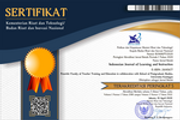ENHANCING PEDAGOGICAL COMPETENCIES IN PRE-SERVICE TEACHERS’ THROUGH MICROTEACHING: A QUALITATIVE STUDY
Abstract
Pedagogical competence is one of compulsory competencies required for teachers to perform their tasks professionally. To produce qualified teachers, many teacher training institutions provide courses that can help pre-service teachers build their pedagogical competences, such as Microteaching. However, not all pre-service teachers understand the importance of this course, and they barely take this course seriously. This research aimed to explore how Microteaching course can assist pre-service teachers build their pedagogical competences and explores its aspects that can be improved. Utilizing qualitative approach, six participants of preservice teachers of English language education department of Private University in Central Java were involved, and they were individually interviewed to collect the data. Microteaching course enables pre-service teachers build their pedagogical competences in that 1) it improves their lesson plan, 2) it provides them with teaching practice experiences, and 3) it gives opportunities for them to evaluate their teaching practices. In addition, Microteaching course enables the pre-service teachers to build their pedagogical competencies aspects, comprising 1)identifying students’ characteristics, 2) carrying out reflection, 3) understanding students’ learning, 4) developing students’ potentials, 5) building good communication skills, and 6) carrying out assessment and evaluation. As microteaching course enables pre-service teachers improve their pedagogical knowledge in many aspects, students of teacher training should take the course more seriously.
Full Text:
PDFReferences
Adamu, I. (2016). The role of teacher training institutions in technical and vocational education and training (TVET) in Nigeria. Journal of Advanced Research in Social and Behavioural Sciences, 1(2), 46-51.
Arifmiboy, A. (2019). Microteaching: Model Tadaluring. In: Wade Group.
Birt, L., Scott, S., Cavers, D., Campbell, C., & Walter, F. (2016). Member checking: a tool to enhance trustworthiness or merely a nod to validation? Qualitative health research, 26(13), 1802-1811.
Bouck, E. C., & Park, J. (2019). Special Education Transition Services for Students with Intellectual Disabilities. In Special Education Transition Services for Students with Disabilities (Vol. 35, pp. 53-67). Emerald Publishing Limited.
Creswell, J. D., & Lindsay, E. K. (2014). How does mindfulness training affect health? A mindfulness stress buffering account. Current directions in psychological science, 23(6), 401-407.
Creswell, J. W., & Poth, C. N. (2016). Qualitative inquiry and research design: Choosing among five approaches. Sage publications.
Disas, E. P. (2017). Analisis kebijakan pendidikan mengenai pengembangan dan peningkatan profesi guru. Jurnal Penelitian Pendidikan, 17(2).
Enama, P. R. B. (2021). Student Teachers' Competence in Lesson Planning During Microteaching. Journal of Teacher Education and Educators, 10(3), 341-368.
Farrokhi, F., & Mahmoudi-Hamidabad, A. (2012). Rethinking convenience sampling: Defining quality criteria. Theory & practice in language studies, 2(4).
Itzik, L., & Walsh, S. D. (2023). Giving Them a Choice: Qualitative Research Participants Chosen Pseudonyms as a Reflection of Self-Identity. Journal of Cross-Cultural Psychology, 54(6-7), 705-721.
Karlström, M., & Hamza, K. (2019). Preservice science teachers’ opportunities for learning through reflection when planning a microteaching unit. Journal of Science Teacher Education, 30(1), 44-62.
Loeneto, B. A., Alwi, Z., & Oktarina, S. (2020). In-Service Teacher Training and Education in Indonesia. Creative Education, 11(03), 328.
Majoni, C. (2017). Assessing the effectiveness of microteaching during teacher preparation. European Journal of Research and Reflection in Educational Sciences, 5(2).
Murtafiah, W., & Lukitasari, M. (2019). Developing Pedagogical Content Knowledge of Mathematics Pre-Service Teacher through Microteaching Lesson Study. Online Submission, 13(2), 201-218.
Nur, A. A. (2020). Meningkatkan kompetensi pedagogik guru di SD yayasan Mutiara Gambut. Jurnal Bahana Manajemen Pendidikan, 2(1), 65-72.
Purwanti, E., Anggraini, R., & Agustina, N. Q. (2023). Teacher professional development during COVID-19 pandemic: Opportunities and challenges. Teaching English as a Foreign Language Journal, 2(1), 1-9.
Putra, D. A., Syafitri, W., Roza, V., & Putri, H. P. (2023). Analysis of Students’ Teaching Skills in Micro-Teaching Course. BiCED Proceeding, 1, 171-177.
Rahman, M. H. (2014). Professional competence, pedagogical competence and the performance of junior high school of science teachers. Journal of education and practice, 5(9), 75-80.
Reddy, C. (2017). Micro teaching: principles, procedures, benefits & limitations. Retrieved on September, 2.
Reddy, K. (2019). Teaching how to teach: microteaching (a way to build up teaching skills). Journal of Gandaki Medical College-Nepal, 12(1), 65-71.
Revina, S., Pramana, R. P., Fillaili, R., & Suryadarma, D. (2020). Systemic constraints facing teacher professional development in a middle-income country: Indonesia’s experience over four decades.
Richard, M. M. (2021). The Impact of Micro Teaching Lessons on Teacher Professional Skills: Some Reflections from South African Student Teachers. International Journal of Higher Education, 10(2), 164-171.
Rohmah, I. I. T. (2021). Microteaching: Preparation and performance. In: Pustaka Learning Center.
Sa'ad, T. U., Sabo, S., & Abdullahi, A. D. (2015). The Impact of Micro-Teaching on the Teaching Practice Performance of Undergraduate Agricultural Education Students in College of Education, Azare. Journal of education and practice, 6(26), 109-115.
Sele, Y., & Sila, V. U. R. (2022). Problematika Kompetensi Pedagogik Guru Dalam Pembelajaran. Biocaster: Jurnal Kajian Biologi, 2(4), 230-235.
Sidik, M. (2021). Perlindungan Hukum Bagi Guru Yang Melakukan Kekerasan Terhadap Siswa. Jurnal As-Said, 1(1), 66-74.
Sihite, D., Jaya, A., & Mortini, A. V. (2024). Microteaching lesson on increasing the student teachers’ ability in teaching English. Esteem Journal of English Education Study Programme, 7(1), 132-143.
Suyanta, S., Muharram, M., Usman, M., Bakhrani A, R., Agung, M., Ganefri, G., Hantje, P., I Nyoman, S., Wahid, A., & Parenreng, J. M. (2020). Educational LPTK, Non-educational LPTK, and Non-LPTK Students' Intention to Become Teacher. Universal Journal of Educational Research, 8(12), 6676-6683.
Widiati, U., & Hayati, N. (2015). Teacher professional education in Indonesia and ASEAN 2015: Lessons learned from English language teacher education programs. ASEAN integration and the role of English language teaching, 3(1), 121-148.
Yan, C., & He, C. (2017). Pair microteaching: an unrealistic pedagogy in pre-service methodology courses? Journal of Education for tEaching, 43(2), 206-218.
Yasin, A. F. (2011). Pengembangan Kompetensi Pedagogik guru pendidikan Agama islam di madrasah (studi kasus di MIN Malang I). El-Qudwah.
DOI: https://doi.org/10.25134/ijli.v7i1.9553
Refbacks
- There are currently no refbacks.
Copyright (c) 2024 Indonesian Journal of Learning and Instruction

This work is licensed under a Creative Commons Attribution-NonCommercial-ShareAlike 4.0 International License.

